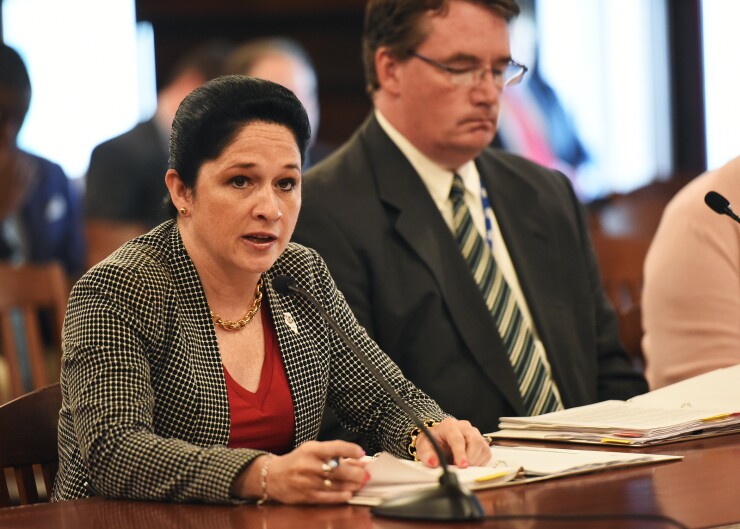CHICAGO — Harvey, Illinois, revenue bondholders won a partial victory this week when the state comptroller concluded they will continue to get first crack on local home rule sales tax collections.
But the comptroller's ruling sets a precedent that is worrisome for many other local bondholders around the state who fear they will fall behind pension funds in competition for a limited pot of revenue.
Holders of the Harvey's $6 million hotel-motel sales tax revenue bonds issued in 2008 will continue to receive the city’s home rule taxes collected on its behalf by the state — likely enough to cover debt service. But they took a backseat on the city's normal share of state sales taxes, which will go directly to cover overdue pension fund contributions.

State Comptroller Susana Mendoza delivered a letter ruling on the Harvey dispute ahead of a court hearing Monday. It marks the conclusion of her review of the city’s protest of the Harvey police pension fund’s certified request that state funds be diverted to meet a $7 million pension funding judgment.
“The office of the comptroller is statutorily bound to withhold and remit to the pension fund the payments that are the subject of this protest,” the letter says.
The first implementation of the state’s newly implemented public safety pension intercept law appears to give pension funds an edge to claim revenues bondholders and local government services also rely upon.
Conclusion of the review clears the path to distribute of $2.3 million of intercepted funds to the police fund Wednesday under a 2011 public safety pension funding law and 2015 amendments that allow for the diversion of “state funds” beginning in fiscal 2016.
The letter does not address a competing firefighter pension fund claim, filed shortly after the police fund’s certified request, arguing it should share in the distribution to cover its own $12 million judgment.
Withheld home rule taxes would be distributed to the bond trustee at the same time as the other taxes are sent to the police fund.
“Municipal home rule sales taxes are not state funds” under the applicable pension code articles “and shall therefore be released according to standard procedure,” the letter continued. The comptroller has so far diverted $279,000 in home rule taxes that would have flowed to bond trustee Amalgamated Bank of Chicago in monthly payments since February.
Those funds plus future monthly additions will likely be sufficient to cover the next debt service payment of $415,000 due Aug. 1. The $145,000 Feb. 1 payment was made with previously forwarded funds.
The latest development in the Harvey saga unfolded Monday in Cook County Circuit Court Judge Raymond Mitchell’s courtroom. The comptroller’s office distributed the letter to lawyers for Harvey, Amalgamated Bank, the police fund, and the firefighters’ fund.
The distribution plans, however, are far from final. Harvey is trying to reach what it describes as a “global settlement” with the various stakeholders to free up about 75% of the $2.3 million of the withheld funds and divert a similar amount going forward.
Such a settlement remained elusive Tuesday.
“I’m more optimistic than I have been,” Mitchell said Monday. The city and the firefighters' pension fund asked Mitchell to issue a temporary restraining order blocking the comptroller from distributing the funds as planned Wednesday whether or not a settlement is reached. That’s because it would take several days for the pension boards to convene and cast a vote. The judge granted the firefighters' fund TRO request Tuesday..
The withholding has triggered
In the case of the Harvey revenue bondholders, those fears came to fruition with the interruption of their flow of revenue to the trustee.
It was not immediately clear whether the comptroller’s finding, given the mixed results for Harvey bondholders, would ease worries or further fuel concerns among municipal market participants.
It was also not immediately clear whether the comptroller’s decision would fully resolve the bondholders’ involvement in the Harvey case. “That’s to be determined,” Brent Vincent of Bryan Cave Leighton Paisner, a lawyer representing the bond trustee, told the judge Monday, but it was generally viewed in the courtroom as a victory for bondholders.
Lawyers predicted even if the Harvey revenue bondholder claim is resolved by freeing up home rule taxes, other similar situations could surface as public safety funds take advantage of the intercept law. The comptroller’s conclusions could also face litigation from another municipality.
“Harvey is the first, but it’s not the last,” according to one lawyer, who said there are eight to 10 other borrowers with similar sales tax bond structures. The diversion issue could also eventually impact general obligation bondholders if intercepted revenues leave a municipality to choose between maintaining critical services and paying debt service.
For Harvey, the intercept law has prompted a funding crisis that threatens city operations. The city already cut its public safety staff by about half. Without a solution, the city would not see any state-collected funds until the $7 million police pension judgment and $12 million firefighters’ fund judgment are paid off.

“The city can’t afford any more and maintain operations,” Harvey's attorney, Bob Fioretti, said Monday.
The revenue bondholders were granted authority to intervene in the case on May 10.
Holders of the Hotel-Motel Tax and Sales Revenue Bonds are repaid with revenues from the city’s hotel-motel tax and then by its share of state-collected sales, use, and occupation taxes under the bond ordinance adopted by the city council on Aug. 25, 2008.
All state-shared sales taxes and all home rule taxes needed to cover debt service go directly to the trustee from the comptroller. The city treasurer is supposed to remit all hotel taxes directly to the trustee but the city has long failed to forward any from existing facilities and the hotel project was never built.
The city collected $163,000 in hotel motel taxes in 2016 but debt service totaled $560,000 that year.
In their complaint, bondholders argue that the pension law in question, approved in 2010 and amended in 2015, does not apply to overdue contributions prior to fiscal 2016 when the diversion provision took effect.
The intercept levels were phased in from 2016 to fiscal 2018 with 100% of funds now available for diversion. The intercept process was not put in place until this year.
The lawsuit asks the court to declare that the bondholders’ irrevocable “contractual pledge” of state collected revenues is superior to the pension fund claims because they possess “a pre-existing superior vested right to payment from those collections.”
The bondholders also want the judge to find that the home rule taxes don’t qualify as “state funds” because the state solely collects them on behalf of the city – an argument the comptroller agreed with in her decision Monday.
“The interception of 100% of local share state taxes and home rule taxes substantially impairs the city’s performance of its pre-existing contractual obligation under the 2008 bond ordinance” and is unconstitutional, the bondholder complaint says. “The legislature’s decision to prioritize the rights of pension fund holders to the intercepted funds over parties such as the Series 2008A bondholders who have pre-existing contractual pledges of and irrevocable rights to the local share state taxes and home rule taxes is arbitrary and capricious.”
The comptroller’s office did not elaborate or publicly disclose its reasoning behind the finding that the pension claim comes ahead of the bond obligation with regard to state sales taxes.
Various lawyers at the hearing suggested that the office's finding was likely based on the city’s ordinance, which simply directs the state to send to a third party – the trustee – revenue the city is entitled to receive.
The pension claims take precedent because the intercept is a direct order under state law that interferes with the existing flow of revenues.
"We don’t have discretion,” an official from the comptroller's office said during the hearing.
The issue could eventually be the subject of litigation, several lawyers at the hearing said.
Proceeds of the revenue bonds were supposed to finance construction of a hotel and conference center. The city diverted proceeds to cover operations and the project was never built, so bondholders have had to rely on the sales tax collections to recoup their investment. All debt service payments are current.
The city faced regulatory sanctions for misleading bondholders about the use of proceeds and repayment prospects and the Securities and Exchange Commission in an unprecedented move went to court to block an impending sale in 2014 as its probe was ongoing.
The city argues in its own lawsuit filed last month to free up the withheld funds that bondholders have a priority claim on the sales taxes and the sales taxes are city property that is pledged to bondholders.
The diversion prompted a recent back-and-forth in the courts as the circuit court originally rejected the city’s preliminary injunction request to free up the funds. An appellate court overturned that decision but the Illinois Supreme Court on April 26 vacated the appellate ruling.
The central issue holding up a potential settlement is how to divide funds between the police fund and the firefighters’ fund. The firefighters fund wants a greater share than the police fund has offered and the city has so far said it can’t make up the difference, lawyers told the judge Monday.
“We’ve got kind of an impasse here,” said Andrew Schwartz, of Schwartz & Kanyock LLC, who represents the firefighters' fund. He contends the 2011 law does not define priority status on pension fund claims. The firefighters fund also wants any share it is to receive under a settlement to flow directly from the comptroller’s office and not the city.
If a settlement is not reached, the firefighters fund would likely contest the comptroller’s decision that the police fund comes first because it was first to submit a certified claim. The pension statute doesn’t provide direction on priority status of claims.
The comptroller’s office is hoping for a settlement or court guidance and its attorney general's office lawyers suggested the parties could seek a recertification process that would specify what percentage of funds are to be withhold and the parties to which they would be distributed.
The law stands to have a sweeping short- and long-term impact statewide, S&P said in a recent special report, because if the intercept becomes commonplace it could strain some issuers. Moody’s Investors Service warned that the Harvey crisis illustrates how municipal pensions are ‘must-pay’ obligations under Illinois law and have greater protection against default than a city’s general obligation bonds.
Published reports have warned that several hundred pension funds may qualify for use of the intercept with more than 600 local government public safety pensions outside Chicago carrying about $9.9 billion of unfunded liabilities with a collective funded ratio of 57.58%. Harvey is not rated by any rating agency and it has previously defaulted on some debt service payments.





